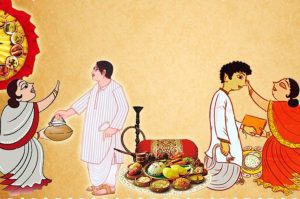Discover how West Bengal is celebrating Jamai Shashti 2025 with the ‘Jamai Aador Food Festival’, blending tradition and tourism. Highlights, dishes, venues, and cultural impact explored.
In a heartwarming celebration of Bengali culture and family ties, the West Bengal Tourism Department hosted a vibrant food festival titled “Jamai Aador” in May 2025. The event, held at the state’s iconic eco-tourism venues and prominent hotels, was dedicated to the beloved Bengali tradition of Jamai Shashti — a day that honors sons-in-law with love, food, and blessings. The festival sought to blend age-old customs with modern hospitality, offering an immersive experience of traditional cuisine and cultural pride.
Historical Significance of Jamai Shashti
Jamai Shashti is a revered Bengali festival rooted in familial love and tradition. Observed primarily by married women for their sons-in-law, it falls on the sixth day of the Hindu month of Jyestha. Traditionally, the day includes elaborate feasts, rituals, and ceremonial blessings. The mother-in-law (shashuri) performs puja and applies a ceremonial mark on the jamai’s forehead, followed by a luxurious meal featuring regional delicacies.

Historically, the practice symbolizes strengthening the bond between families. Over time, it has become a cherished part of Bengali social customs, with a focus on culinary opulence and intergenerational bonding.
The Initiative by West Bengal Tourism
Recognizing the emotional and cultural resonance of Jamai Shashti, the West Bengal Tourism Department curated the “Jamai Aador” food festival to promote culinary tourism and revive interest in Bengali gastronomy. Held at state-run tourist lodges and top hotels, the festival offered special menus and cultural programs centered around the theme of pampering the jamai.
Tourism Minister Indranil Sen emphasized that this initiative is not just about tradition but also about economic and cultural rejuvenation. By highlighting Bengali cuisine and heritage through such festivals, the state aims to boost domestic tourism and create livelihood opportunities for local artisans, chefs, and hospitality workers.
Locations and Participation
The Jamai Aador Food Festival was organized across a wide network of government-owned hotels and tourist lodges including:
- Peerless Inn, Kolkata
- Malancha Tourism Property, Digha
- Mainak, Siliguri
- Meghbalika, Murshidabad
- Rangabitan, Santiniketan
Private hotels and restaurants also joined in the initiative, offering their own versions of jamai-adored feasts. Culinary competitions, cultural performances, and family photo booths made the festival even more engaging.
Jamai Aador Food Festival: What’s on the Menu?
At the heart of the festival was the food — a lavish spread of quintessential Bengali dishes meticulously prepared to reflect both tradition and indulgence. Some highlights included:
- Shukto – A slightly bitter and creamy vegetable dish served as an appetizer.
- Luchi & Alur Dom – Deep-fried flatbreads with a spicy potato curry.
- Shorshe Ilish – Hilsa fish cooked in mustard gravy, a Bengali favorite.
- Chingri Malai Curry – Prawns simmered in a coconut milk-based curry.
- Pathar Mangsho – Spicy mutton curry.
- Mishti Doi & Rosogolla – Traditional Bengali sweets, an indispensable part of the feast.
Each venue tried to present a regional variation, highlighting the diversity of Bengal’s culinary landscape — from the riverine delicacies of the Sundarbans to the sweet traditions of Krishnanagar.
Cultural Programs and Performances
Beyond food, the festival featured an array of cultural activities aimed at reviving the spirit of community and celebration. Folk music, baul performances, and recitations of Tagore’s poetry added a rich cultural dimension to the event.


In several venues, traditional Bengali games and jamai competitions were organized, where sons-in-law were playfully judged on their appetite, manners, and even knowledge of Bengali customs. Winners received mementos and hampers curated with artisanal products.
Public Reception and Participation
The Jamai Aador Food Festival witnessed enthusiastic participation from locals and tourists alike. Social media platforms were flooded with posts featuring jamai feasts, selfies with mother-in-laws, and praise for the Tourism Department’s initiative. Local influencers and food bloggers extensively covered the events, contributing to the festival’s viral reach.
Restaurant owners and hoteliers reported a surge in bookings and footfalls during the event. Many attendees remarked on the nostalgic value of the festival, stating that it rekindled childhood memories and brought families closer together.
Economic and Cultural Impact
According to Tourism Department estimates, the Jamai Aador initiative led to a 30% increase in occupancy across state tourism lodges during the festival week. Local vendors of sweets, spices, and handicrafts also saw a boost in sales.
Beyond immediate economic benefits, the festival underscored the potential of cultural tourism as a sustainable model. It encouraged culinary artisans and revived interest in traditional Bengali cooking, which is often overshadowed by global cuisine trends.
Role of Social Media and Influencers
The festival’s reach was significantly amplified by digital platforms. The hashtag #JamaiAador2025 trended on X (formerly Twitter) and Instagram, with celebrities and influencers sharing their festive meals and personal stories.
The Tourism Department collaborated with well-known food bloggers and cultural commentators to livestream events and host virtual cooking sessions. This helped engage the Bengali diaspora and non-resident Indians who shared their own versions of Jamai Shashti celebrations online.
Voices from the Ground
Several participants shared their heartfelt experiences from the festival:
Sanchita Ghosh, a homemaker from South Kolkata, said: “I haven’t cooked such a large meal since my daughter’s wedding. The festival reminded me how food brings us together.”
Pradip Chatterjee, a son-in-law visiting from Bangalore, remarked: “Being pampered like this made me feel like a prince. I’ll make sure to attend every year.”
Local hotel staff also noted how the initiative gave them a sense of pride in their regional identity, as they served dishes they had grown up eating but rarely saw in commercial menus.
Government’s Future Plans
Buoyed by the success of Jamai Aador, the West Bengal Tourism Department announced plans to institutionalize the event as an annual affair. Future editions will aim to expand the festival to rural homestays and involve more grassroots culinary talent.
There are also proposals to document the recipes, rituals, and oral histories associated with Jamai Shashti in a digital archive. This would serve both as a cultural repository and a promotional tool for global audiences.
Challenges and Areas for Improvement
While the overall response was overwhelmingly positive, the festival did face a few logistical hurdles. Some attendees at remote locations reported delays in service and limited seating arrangements. Others pointed out the need for better signage and transportation coordination.
Environmental concerns were also raised, with calls for more sustainable packaging and waste management practices. The Tourism Department has acknowledged the feedback and promised improvements in future editions.
A Celebration of Love, Culture, and Cuisine
The Jamai Aador Food Festival was more than a culinary event; it was a vibrant expression of Bengali identity, hospitality, and familial affection. By institutionalizing a cherished cultural ritual, West Bengal Tourism not only promoted its rich gastronomic heritage but also created an inclusive space for communal joy and economic activity.
As society continues to evolve, such festivals serve as important reminders of the enduring power of tradition in shaping collective well-being. Whether as a son-in-law being doted upon or a parent expressing love through food, Jamai Aador brought smiles, strengthened bonds, and showcased the timeless elegance of Bengali culture.
Do Follow, Government/Official Only:
-
West Bengal Tourism Department
Official website with festival updates and tourism initiatives.
👉 https://wbtourism.gov.in -
Incredible India – Ministry of Tourism, Government of India
Includes Indian festival calendars, cultural tourism promotions, and state-wise experiences.
👉 https://www.incredibleindia.org -
India Tourism Kolkata (Ministry of Tourism)
Regional government tourism office providing updates on events and festivals in Eastern India.
👉 https://www.tourism.gov.in/india-tourism-kolkata -
Ministry of Culture, Government of India
For context on cultural traditions like Jamai Shashti and their preservation.
👉 https://www.indiaculture.nic.in -
West Bengal State Portal
For official state notices, public events, and festival holiday announcements.
👉 https://wb.gov.in
Also read: Home | Channel 6 Network – Latest News, Breaking Updates: Politics, Business, Tech & More

